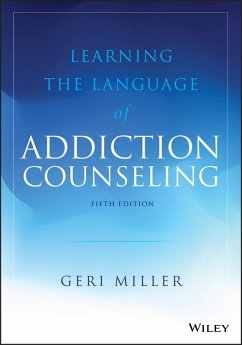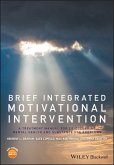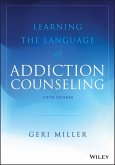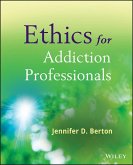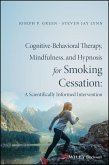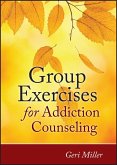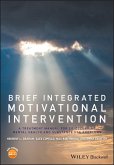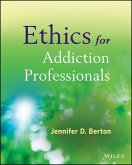Learning the Language of Addiction Counseling (eBook, ePUB)


Alle Infos zum eBook verschenken

Learning the Language of Addiction Counseling (eBook, ePUB)
- Format: ePub
- Merkliste
- Auf die Merkliste
- Bewerten Bewerten
- Teilen
- Produkt teilen
- Produkterinnerung
- Produkterinnerung

Hier können Sie sich einloggen

Bitte loggen Sie sich zunächst in Ihr Kundenkonto ein oder registrieren Sie sich bei bücher.de, um das eBook-Abo tolino select nutzen zu können.
Fully revised, Learning the Language of Addiction Counseling, Fourth Edition introduces students and mental health professionals to the field of addiction counseling and helps them develop the knowledge, understanding, and skills needed to counsel people who are caught in the destructive cycle of addiction. Drawing from her years of experience working in the addiction-counseling field, Geri Miller provides an engaging, balanced overview of the major theoretical underpinnings and clinical practices in the field. From assessment and diagnosis of addiction to preparing for certification and…mehr
- Geräte: eReader
- mit Kopierschutz
- eBook Hilfe
- Größe: 7.85MB
![Brief Integrated Motivational Intervention (eBook, ePUB) Brief Integrated Motivational Intervention (eBook, ePUB)]() Hermine L. GrahamBrief Integrated Motivational Intervention (eBook, ePUB)43,99 €
Hermine L. GrahamBrief Integrated Motivational Intervention (eBook, ePUB)43,99 €![Learning the Language of Addiction Counseling (eBook, PDF) Learning the Language of Addiction Counseling (eBook, PDF)]() Geri MillerLearning the Language of Addiction Counseling (eBook, PDF)65,99 €
Geri MillerLearning the Language of Addiction Counseling (eBook, PDF)65,99 €![Ethics for Addiction Professionals (eBook, ePUB) Ethics for Addiction Professionals (eBook, ePUB)]() Jennifer D. BertonEthics for Addiction Professionals (eBook, ePUB)32,99 €
Jennifer D. BertonEthics for Addiction Professionals (eBook, ePUB)32,99 €![Cognitive-Behavioral Therapy, Mindfulness, and Hypnosis for Smoking Cessation (eBook, ePUB) Cognitive-Behavioral Therapy, Mindfulness, and Hypnosis for Smoking Cessation (eBook, ePUB)]() Joseph P. GreenCognitive-Behavioral Therapy, Mindfulness, and Hypnosis for Smoking Cessation (eBook, ePUB)40,99 €
Joseph P. GreenCognitive-Behavioral Therapy, Mindfulness, and Hypnosis for Smoking Cessation (eBook, ePUB)40,99 €![Group Exercises for Addiction Counseling (eBook, PDF) Group Exercises for Addiction Counseling (eBook, PDF)]() Geri MillerGroup Exercises for Addiction Counseling (eBook, PDF)24,99 €
Geri MillerGroup Exercises for Addiction Counseling (eBook, PDF)24,99 €![Brief Integrated Motivational Intervention (eBook, PDF) Brief Integrated Motivational Intervention (eBook, PDF)]() Hermine L. GrahamBrief Integrated Motivational Intervention (eBook, PDF)43,99 €
Hermine L. GrahamBrief Integrated Motivational Intervention (eBook, PDF)43,99 €![Ethics for Addiction Professionals (eBook, PDF) Ethics for Addiction Professionals (eBook, PDF)]() Jennifer D. BertonEthics for Addiction Professionals (eBook, PDF)32,99 €
Jennifer D. BertonEthics for Addiction Professionals (eBook, PDF)32,99 €-
-
-
Dieser Download kann aus rechtlichen Gründen nur mit Rechnungsadresse in A, B, BG, CY, CZ, D, DK, EW, E, FIN, F, GR, HR, H, IRL, I, LT, L, LR, M, NL, PL, P, R, S, SLO, SK ausgeliefert werden.
- Produktdetails
- Verlag: John Wiley & Sons
- Seitenzahl: 656
- Erscheinungstermin: 2. Dezember 2020
- Englisch
- ISBN-13: 9781119433064
- Artikelnr.: 60782380
- Verlag: John Wiley & Sons
- Seitenzahl: 656
- Erscheinungstermin: 2. Dezember 2020
- Englisch
- ISBN-13: 9781119433064
- Artikelnr.: 60782380
- Herstellerkennzeichnung Die Herstellerinformationen sind derzeit nicht verfügbar.
Acknowledgments xiii
Chapter 1 Introduction 1
Personal Reflections 1
Addiction Counseling Influences 6
Models of Addiction 17
Appendix 1A: Language of Recovery 25
Appendix 1B: Summary of Peer Recovery Movement (June 2019) 27
Appendix 1C: SAMHSA-NAADAC Addiction Professional Education & Career Ladder 29
Chapter 2 Theories of Counseling Applied To Addiction Treatment 31
Personal Reflections 31
Development of a Theoretical Framework for Addiction Counseling 32
Dangers in Developing a Theoretical Framework and Recommendations 34
General Counseling Theories Applied to Addiction Treatment 38
Chapter 3 Assessment and Diagnosis of Addiction 49
Personal Reflections 49
Stages of Change 50
DWI/DUI/OWI/OUI Assessments 51
Assessment 51
Interviews 53
Behavioral Observations 61
Physiological Instruments 62
Psychometric Instruments 62
Diagnosis 77
Chapter 4 Co-Occurring Disorders and Behavioral Addictions 82
Personal Reflections 82
Co-Occurring Disorders 83
Collaboration Between the Mental Health and Substance Abuse Fields 85
Assessment 87
Treatment 90
Behavioral Addictions 104
Chapter 5 The Core Treatment Process of Addictions 113
Personal Reflections 113
Integrated Care 114
The Experience of the Addict as It Relates to Treatment 115
Crisis Intervention 115
Individual Therapy 122
Group Therapy 131
Family Therapy 144
Chapter 6 Treatment-Related Issues and Counseling Approaches 154
Personal Reflections 154
Sexual Issues 156
HIV/AIDS 165
Intimate Partner Violence 173
Homelessness 184
Specific Counseling Approaches 188
Chapter 7 Relapse Prevention 202
Personal Reflections 202
Counselor Approaches 203
Relapse-Prevention Models 208
Counseling Techniques 216
Influencing Factors 224
Case Studies of Special Populations 225
Co-Occurring Disorders 228
Chapter 8 Self-Help Groups 231
Personal Reflections 231
Suggestions for Counselors 233
12-step Groups 235
12-step Alternative Groups 244
Matching Self-help Groups to Meet Client Needs 251
Special Issues 258
Appendix 8A: Stories of Recovery 265
Chapter 9 Elaboration On Specific Therapies and Techniques Relevant To Addiction Counseling 267
Personal Reflections 267
Client Resilience 268
Positive Psychology 271
Stages of Change Model 275
Overview of Evidence-Based Practice (EBP) 280
Motivational Interviewing 282
Brief Therapy 289
Behavioral/Cognitive-Behavioral 296
Chapter 10 Culturally Sensitive Addiction Counseling 302
Personal Reflections 302
Defining Multicultural 305
Social-Environmental Aspects 306
Breakdown of Communication 310
Multicultural Competence/Multicultural Orientation 310
Dialogue 313
General Counseling Suggestions 316
Assessment, Treatment, and Aftercare Issues 316
Overall Substance Use/Abuse Exploration Multicultural Exercises 377
Chapter 11 Chronic Pain Assessment and Treatment 381
Personal Reflections 381
Definition of Pain 386
Issues of Living Sober with Chronic Pain 387
Assessment and Treatme
Acknowledgments xiii
Chapter 1 Introduction 1
Personal Reflections 1
Addiction Counseling Influences 6
Models of Addiction 17
Appendix 1A: Language of Recovery 25
Appendix 1B: Summary of Peer Recovery Movement (June 2019) 27
Appendix 1C: SAMHSA-NAADAC Addiction Professional Education & Career Ladder 29
Chapter 2 Theories of Counseling Applied To Addiction Treatment 31
Personal Reflections 31
Development of a Theoretical Framework for Addiction Counseling 32
Dangers in Developing a Theoretical Framework and Recommendations 34
General Counseling Theories Applied to Addiction Treatment 38
Chapter 3 Assessment and Diagnosis of Addiction 49
Personal Reflections 49
Stages of Change 50
DWI/DUI/OWI/OUI Assessments 51
Assessment 51
Interviews 53
Behavioral Observations 61
Physiological Instruments 62
Psychometric Instruments 62
Diagnosis 77
Chapter 4 Co-Occurring Disorders and Behavioral Addictions 82
Personal Reflections 82
Co-Occurring Disorders 83
Collaboration Between the Mental Health and Substance Abuse Fields 85
Assessment 87
Treatment 90
Behavioral Addictions 104
Chapter 5 The Core Treatment Process of Addictions 113
Personal Reflections 113
Integrated Care 114
The Experience of the Addict as It Relates to Treatment 115
Crisis Intervention 115
Individual Therapy 122
Group Therapy 131
Family Therapy 144
Chapter 6 Treatment-Related Issues and Counseling Approaches 154
Personal Reflections 154
Sexual Issues 156
HIV/AIDS 165
Intimate Partner Violence 173
Homelessness 184
Specific Counseling Approaches 188
Chapter 7 Relapse Prevention 202
Personal Reflections 202
Counselor Approaches 203
Relapse-Prevention Models 208
Counseling Techniques 216
Influencing Factors 224
Case Studies of Special Populations 225
Co-Occurring Disorders 228
Chapter 8 Self-Help Groups 231
Personal Reflections 231
Suggestions for Counselors 233
12-step Groups 235
12-step Alternative Groups 244
Matching Self-help Groups to Meet Client Needs 251
Special Issues 258
Appendix 8A: Stories of Recovery 265
Chapter 9 Elaboration On Specific Therapies and Techniques Relevant To Addiction Counseling 267
Personal Reflections 267
Client Resilience 268
Positive Psychology 271
Stages of Change Model 275
Overview of Evidence-Based Practice (EBP) 280
Motivational Interviewing 282
Brief Therapy 289
Behavioral/Cognitive-Behavioral 296
Chapter 10 Culturally Sensitive Addiction Counseling 302
Personal Reflections 302
Defining Multicultural 305
Social-Environmental Aspects 306
Breakdown of Communication 310
Multicultural Competence/Multicultural Orientation 310
Dialogue 313
General Counseling Suggestions 316
Assessment, Treatment, and Aftercare Issues 316
Overall Substance Use/Abuse Exploration Multicultural Exercises 377
Chapter 11 Chronic Pain Assessment and Treatment 381
Personal Reflections 381
Definition of Pain 386
Issues of Living Sober with Chronic Pain 387
Assessment and Treatme
